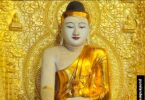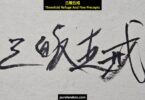[25] Top Ten Considerations On Organ And Body Donations
十大器官与遗体捐赠的考虑因素
Ironically, some who advocate for such donations do not make them personally, while all advocates have yet to consider the below and more with deeper Buddhist perspectives.
[1] Not Yet Dead: Organ (and body) donations are made when alive, with the heart (and/or ventilator) still pumping oxygen to keep the organs fresh for harvesting. Thus, the donors are not actually dead, as in without physical breathing. (The donors are assumed to be ‘brain dead’ [脑死], but there is still no worldwide consensus on what is brain death’s actual definition, while some patients pronounced ‘brain dead’ do revive later and live on well.)
[2] Not Yet Ready: There can be a world of difference between being willing to donate organs and being ready to donate organs. There will be pain maginified by nine times during dying, never experienced before, thus not possible to fully prepare for in advance.
[3] Not Always Beneficial: Those with organs donated to might be strangers, who might or might not do more harm to more sentient beings with prolonged lives. For example, what if the one donated to has a failed organ due to heavy consumption of sentient beings’ flesh, and fully intends to continue consuming much more meat after getting a new organ? How is this beneficial to sentient beings on the whole? Will the organ help one but harm many more?
[4] Not Yet Bodhisattvas: The fact that Bodhisattvas (菩萨) accomplished with great compassion (慈悲) and wisdom (智慧) sacrifice their lives for others, and that Buddhists should emulate them does not mean the average person is ready to do so fully and immediately now. The fact that these Bodhisattvas are great practitioners is often neglected and/or forgotten. In contrast, most of us are ordinary beings (凡夫) are susceptible to anguish due to a little pain, fear, anger and regret, what more much.
[5] Not Fully Good: Organ donation is wholly good only if it definitely helps everyone involved and harms no one at all, including the donor, especially in terms of the prospects of securing a better future life (来生). How can this be guaranteed by ordinary persons, who are definitely not great spiritual practitioners?
[6] Not Only Way To Give: There is outer giving (外布施) of objects external to the body and there is inner giving (内布施) of that internal. Organ and body donations are not the only means to practise the latter in terms of body parts, as there can be donation of blood, part of a liver, bone marrow, kidney, hair… All can be done safely. In fact, blood donations can be made repeatedly for many times in one lifetime, to save many lives; not just one or a few.
[7] Not Yet Useless: Since organ donation is done when alive, we need our organs as long as so. Thus, they are not ‘already useless’, ‘ready’ to be cut and transferred upon ‘brain death.’ It is with (and after) the cutting that there is actual physical death. It is after death and departure of the consciousness (神识), who is not attached to the remains, that the organs and body are of no more use to the deceased.
[8] Not Clear-Cut: The consciousness of the donor has yet to depart during organ donation. We know this because organ donation requires breathing persons. As long as breathing, the consciousness is still within the body. Even if pronounced ‘brain dead’, breathing will continue, thus still being alive. This means the donor’s consciousness is always within the body, even in the midst of being cut open. Normal dying processes are already physically and mentally disturbing for the average person, what more if being cut open, with magnified pain too.
[9] Not Without Pain: Organ and body donations are considered ‘perfect’ (or complete) (圆满) only if the one donating and the one donated to have the best physical and spiritual results. This cannot be ensured easily. Especially for the deceased, if dying in great pain and fear, with anger for the pain caused, and with regret for having consented to the donation, with such negative emotions as the last thoughts before being reborn, there can be negative rebirths. Any good karma (善业) meant to be created is also destroyed once there is regret for the ‘good’ being done.
[10] Not From Pure Land: If reborn in Pure Land (净土), to become Great Bodhisattvas (大菩萨), we can help immeasurably more beings completely, guiding them all the way towards Buddhahood (佛果). Subsequent organ and body donations upon departure from Pure Land will be free from any suffering and can be done readily and repeatedly. In the mean time, we are not such Great Bodhisattvas yet, who should consider whether to jeopardise reaching of Pure Land.
相关教理
Related Teachings:
器官与遗体捐赠
[3] Organ And Body Donations
https://purelanders.com/2015/12/30/important-guidelines-1-before-dying-pure-land-passport-section-4a
HOTA (Human Organ Transplant Act): Opt-In Or Opt-Out?
https://purelanders.com/2015/09/01/hota-human-organ-transplant-act-opt-in-or-opt-out
Should Those ‘Brain Dead’ Be Unplugged?
https://purelanders.com/2018/09/04/should-those-brain-dead-be-unplugged
Where Are Teachings On Modern Death Issues From?
https://purelanders.com/2016/12/17/where-are-teachings-on-modern-death-issues-from





